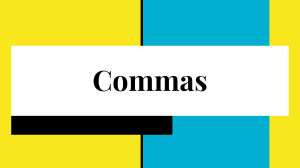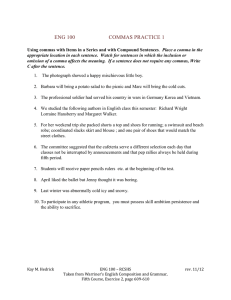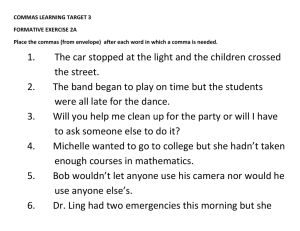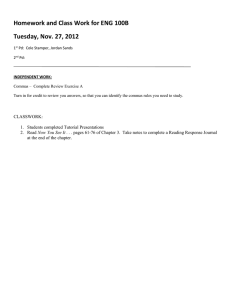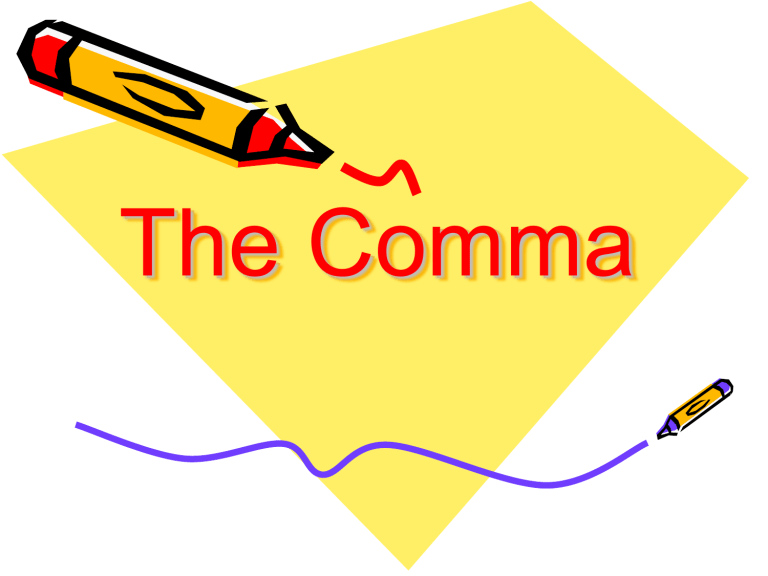
The Comma The commas (,) tells the reader to pause between the words that it separates. Rule 1: Use commas to separate items in a series. Put a comma after each item in the series except the last one. • A series is a list of three or more things. • Examples: The man brought tomatoes, apples, and peaches to the party. Books, magazines, newspapers, and CDs can be found in the library. The students used glue scissors rulers and staples for their projects. • The students used glue, scissors, rulers, and staples for their projects. Cars trucks buses or motorcycles could use the road. • Cars, trucks, buses, or motorcycles could use the road. Rule 2: Two short, related sentences can be made into one sentence. Use a comma and the connecting word and, but, or or. The oxen tried to pull the wagon. The cart was stuck in the mud. The oxen tried to pull the wagon, but the wagon was stuck in the mud. The students were studying. The teacher was correcting papers. • The students were studying, and the teacher was correcting papers. Most children were playing outside. Some children went to the library. • Most children were playing outside, but some went to the library. Rule 3: Use commas to set off words yes, not, and well when they are at the beginning of a sentence. • Yes, I can come to the party. • No, you do not need to bring a present. • Well, I might just bring some extra snacks. Rule 4: Use a comma or commas to set off the names of people who are spoken to directly. • “John, come and lend me some help.” • “What would you like help with, Mary?” • “What I need, John, is some help with my math.” Rule 5: Use a comma to separate the month and the day from the year. • January 3, 2006 • The United States became a nation on July 4, 1776. Rule 6: Use a comma between the names of a city and a state. • Palava, Dombivali • Nasik, Maharashtra Rule 7: Use a comma after the greeting and closing of a friendly letter. Dear Uncle Ralph, Yours truly, Yes you are learning about commas. Yes, you are learning about commas. Rick are you learning about commas? Rick, are you learning about commas? I was born on February 9 2000. I was born on February 9, 2000. I live in Happy Valley Oregon I live in Happy Valley, Oregon Well I was born in Detroit Michigan. Well, I was born in Detroit, Michigan. Dear Class Now you know more about using commas. Sincerely yours Mr. Smith Dear Class, Now you know more about using commas. Sincerely yours, Mr. Smith Let’s Recap • Use commas to separate items in a series. Put a comma after each item in the series except the last one. Bring salad, fruit, and bread. • You can combine two short, related sentences to make one compound sentence. Use a commas and the connecting word and, but, or or. I will come, and you can meet me there. • Use commas to set off the words yes, no, and well when they are are at the beginning of a sentence. Yes, you can borrow my bike. Let’s Recap • Use a comma to set off the names of people who are spoken to directly. Chad, pleases take off your shoes. • Use a comma to separate the month and the day of the year. He came on May 8, 2006. • Use a commas between the names of a city and a state. I visited Canby, Oregon. • Use a commas after the greeting in a friendly letter. • Use a commas after the closing in a letter. Dear Joe, Sincerely yours, Now open Page no. 47 Grammar with ease • We will practice week 10- day 1
